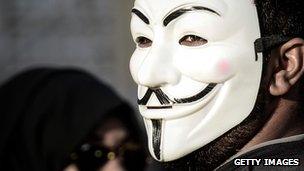'Anonymous attackers' in court over cyber-attacks
- Published

The global Anonymous movement often stages protests in non-digital life
Thirteen alleged members of hacktivist group Anonymous have been indicted, accused of carrying out cyber-attacks.
They have been charged in the US with conspiring to intentionally cause damage to protected computers.
They were said to have targeted firms that refused to process payments for WikiLeaks, the whistle-blowing site founded by Julian Assange.
The group flooded services with large amounts of traffic in an attempt to overwhelm the sites.
This method - known as a Distributed Denial of Service attack, or DDoS - is a typical tactic of the hacktivist movement.
Mastercard and Visa
The accused allegedly targeted groups or businesses they felt did not share the philosophy of Anonymous to make all information free for everyone, regardless of copyright laws or national security considerations.
Those hit included governments, trade associations, law firms and financial institutions.
Court documents said that from September 2010 to January 2011, Anonymous members waged a campaign they dubbed Operation Payback.
In December 2010, the conspirators are alleged to have discussed possible targets related to WikiLeaks, the whistle-blowing site that struggled to receive funding after several payment processing companies, including Mastercard and Visa, refused to facilitate the transfer of donations to the group.
The Swedish prosecutor's office was also hit, in connection with arrest warrants for sexual crimes issued for Mr Assange.
The accused were also said to have gone after music industry bodies in retaliation for action taken against The Pirate Bay, a Sweden-based file sharing website devoted to the illegal downloading of copyrighted material.
- Published2 October 2013
- Published20 August 2013
- Published5 August 2013
- Published5 July 2013